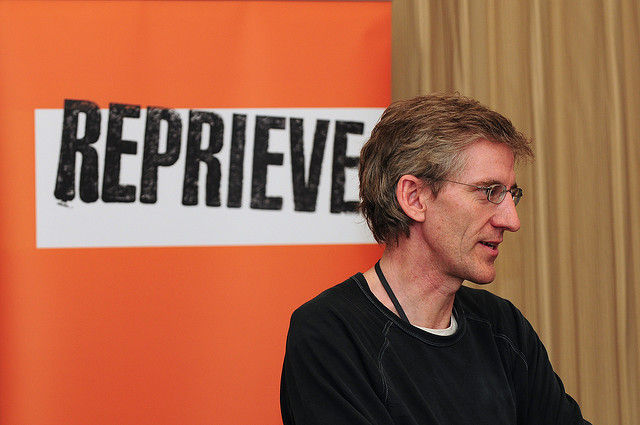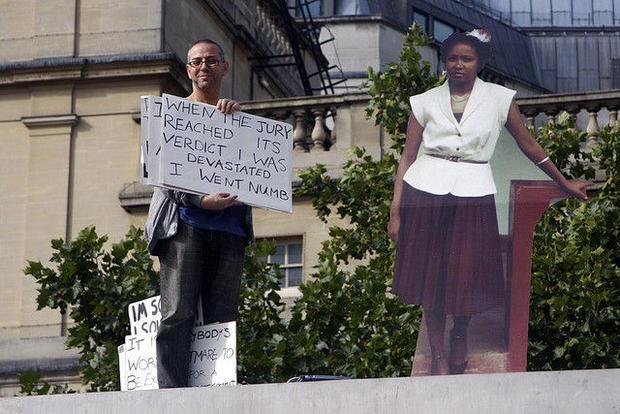
Clive Stafford Smith
If Clive Stafford Smith ever decides to quit the legal profession, he would make a good stand-up comedian, come to think of it, he already does.

Clive Stafford Smith
Santa Claus, the tooth fairy, an honest lawyer and an old drunk are walking down the street together when they simultaneously spot a hundred dollar bill. Who gets it? The old drunk, of course, the other three are mythological creatures.
Jokes about dishonest, sharp or just plain greedy lawyers are two a penny. It is only when you are in a tight spot you realise just how important a good lawyer can be at times. Nor is the law, be it criminal or civil, quite the gravy train it is often thought to be. In Britain, America and doubtless elsewhere, lawyers frequently perform pro bono work, or work for a particular client or clients for which they are not paid.
At the end of the day though, a lawyer is an advocate, it is his task to represent his client to the best of his ability, but he is also an officer of the court, first and foremost he is obligated to uphold justice.
That can he a tricky proposition. What does a lawyer do if he knows his client is guilty? It is not up to him to know, but for the jury to decide. If his client presents him with what appears to be a ludicrous defence, he is obligated to run it, because as we all know, the truth is often stranger than fiction, though seldom as popular. If though, his client says I’m guilty, but put forward this evidence involving false affidavits and perjured witnesses, then he should quite simply resign from the case.
Clive Stafford Smith and his Reprieve organisation have many clients for whom they act in good faith, but Reprieve is also an agenda driven special interest group, and first and foremost on that agenda is the abolition of the death penalty by fair means or foul, or in the case of Mr Stafford Smith, ludicrous. And frankly there is nothing quite so ludicrous as the latest argument he and his gang are running against death by lethal injection. Read this extract, then read it again:
“There are a great many myths surrounding the death penalty, and some of the most pervasive and powerful relate to the use of the lethal injection as a method of execution. It is regarded by many as the safest and most humane method of killing a person. Those few who have looked behind the executioner’s curtain know that this is not the case: quite the reverse. It is in fact an extremely dangerous practice, and the risk of torture is high.”
Yes, you heard right, lethal injection is an unsafe method of execution.
Although this is an ongoing campaign, Reprieve has filed a brief for one convicted double murderer whom they claim is at risk of being executed if not this year then soon. Edmund Zagorski killed two men in 1983. Not content with arguing simply that a man should not be sentenced to death and then kept on “Death Row” for the best part of three decades, they also argue that he is innocent or probably innocent, or even that he was fitted up.
Those who prefer findings of fact to Reprieve’s flim-flam may like to read what the appellate court said about “innocent” Ed.
Stafford Smith and his gang have also lobbied and continue to lobby on behalf of convicted murderess Linda Carty, and as always are not short of dishonest arguments to attempt to shore up her case. To take just one tiny example:
“During the 80s, Linda worked as a hair stylist, and the chatter of women associated with local drug dealing led Linda to work as a confidential informant for the Drug Enforcement Agency”.
No, that is not how she became an informant at all, as Stafford Smith well knows. She stole a car posing as an FBI agent, and agreed to become a snitch in return for probation. This is a finding of fact by a legally constituted court rather than self-serving twaddle by a woman who quite callously organised the kidnapping of a young mother and her newborn baby, then stood over the victim and smothered her with a plastic bag as she lay, bound and gagged in the trunk of a car.

A Reprieve supporter stands atop the empty plinth in Trafalgar Square in September 2009 with a cardboard cut out of convicted murderess Linda Carty.
Returning to the more general objection to death by lethal injection, we can assume that lethal injection as applied by the authorities in the United States does kill people, so by definition it is dangerous, but dangerous only for the person to be executed; there is no risk of the executioner or any of the witnesses being harmed in any way.
Is it humane? More to the point, is there any humane way to kill someone? Obviously, people can be tortured to death slowly and painfully, even by natural means. An accident victim or a person suffering from a terminal disease may experience a long, slow, painful death, but executions carried out in the United States with drugs obtained legally from reputable manufacturers do not cause extreme suffering.
Having said that, there are quicker, indeed instantaneous ways of executing someone. Perhaps Uncle Sam should behead those sentenced to death as they do in Saudi Arabia?
Four years ago, Steven Hayes invaded the home of Dr William Petit, and together with his partner-in-crime Joshua Komisarjevsky, battered him and tied him up in the basement. Dr Petit and his wife were then robbed, and Jennifer Hawke-Petit was raped and strangled, then her body was set on fire. Her daughters were doused with gasoline, and their heads covered with pillowcases, they were left to die from smoke inhalation.
Although he is now on death row, Hayes will almost certainly not be executed for many years if at all. His co-defendant is currently on trial; having been convicted, the jury has to decide if he too is a suitable candidate for execution. Is executing either of these men humane? Of course not, but what is the alternative? They can never be released, so they must both be confined for the rest of their lives. Is that humane? Again, of course not. Anyone who has spent even one day in a prison cell will confirm that. The question Clive Stafford Smith and his gang pose is clearly inappropriate; they should not be asking is this treatment - execution or life imprisonment - humane, but whose fault is it that it is being imposed?
Whether or not either Hayes or Komisarjevsky are executed, one thing is for certain, their deaths will be far more humane than those they inflicted on their totally innocent and undeserving victims.
[The above op-ed was first published November 17, 2011. There was originally a link to the Clive Stafford Smith quote which was archived through WebCite. At the time of writing – April 2022 – this service appears to be defunct. Regarding Steven Hayes and his co-defendant, the death penalty was shortly abolished in Connecticut, so these two monsters are still with us and will be for some time yet.]
Back To Digital Journal Index